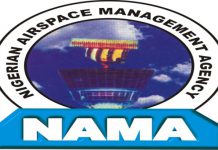
As the global aviation ecosystem is witnessing new and emerging threats, the director general of the Nigerian Civil Aviation Authority (NCAA), Capt Chris Najomo and former helmsman of the agency, Dr. Harold Demuren have spoken of the need to put corresponding and proactive mitigation actions, policies or systems in place.
Speaking at ‘The high-level aviation security stakeholders’ symposium’ held in Lagos yesterday, Najomo described the aviation industry as “the lifeline of global connectivity, acting as a key enabler for commerce, cultural exchange and economic development.”
With such opportunities, he said the industry is bedeviled by increasingly-evolving threats of cyber attacks, terrorism, insider-threats, among others.
He stated that the threat environment “is constantly changing and any attack on civil aviation could be countered by the implementation of effective aviation security counter measures.”
The measures include, but are not limited to vigilance, collaboration, information sharing and coordination among all stakeholder, leveraging advanced technologies like biometrics, artificial intelligence and cyber security measures to enhance security and efficiency as well as compliance and standards.
Najomo added that the treat to aviation could be countered by the implementation of effective aviation security measures and procedures by competent personnel.
“We must remain vigilant and proactive in identifying and mitigating potential threats to civil aviation
“Information sharing and coordination among all stakeholders is essential in preventing and responding to security threats. No one can do it alone,” Najomo stated.
He added: “Let us remember that achieving security is not a destination, rather, it is a continuous painstaking journey requiring the firm commitment to responsibility of every relevant stakeholder.
“Ultimately and working together, we can shape a safer and more secure future for Nigeria and global aviation.”
For his part, Demuren said September 11, 2001 attack in the United State, brought a new dimension to aviation security measures.
Consequently, he said the International Civil Aviation Organisation (ICAO) encouraged member states to take aviation security as the highest priority through primary legislation, regulation, programmes and standard operating procedures to mitigate the threat to civil aviation.
In that wise, he said Nigeria complied with the requirements, as CCTV cameras were installed as additional security layer at the airport apart from the walk-through metal detectors, x-ray screening machines among others.
“We now live in a time where there are new and emerging threats to civil aviation especially, conflict zones, as these areas pose significant risks to civilian aircraft due to potential threats like armed conflict and anti-aircraft weaponry,” he said.
He listed the new and emerging threats to include cyber attacks, biological and radiological threats, violent extremism and perimeter breaches, unruly behavior and airport disruptions,; communication of false information, man portable air defense, (MANPADs); Conflict zones risks, among other.
He also noted that the latest concern in the industry is cyber security, stressing that with increasing reliance on digital platform, cyber security threats are becoming a major concern, requiring proactive cyber security measures.
Demuren singled out insider threat as “one of the worst threats to aviation security.”
“People have different Religious beliefs, political differences, money problems and outright greed.
“In our own particular environment, joblessness is now a major issue. Unfortunately, those who are supposed to protect people compromise security,” he said.
He proffered constant profiling, regular background checks, adequate remuneration and timely payment of salary, training and capacity building, and timely sharing of sensitive security information as the way out of
On the whole, Demuren called on the government and airlines to conduct thorough risk assessments of potential conflict zones, considering factors, like the type of conflict, the presence of anti-aircraft weaponry.
He further said states may restrict or close airspace over conflict zones to protect civilian aircraft from the risk of deliberate or accidental attacks.
“Aviation security is the responsibility of everyone and we must prioritise continuous training and awareness in oversight and implementation agencies.
“There is the need to solidify continuous collaboration and cooperation among the security agencies – the NCAA, Federal Airports Authority of Nigeria (FAAN), aviation security (AVSEC), Nigeria Air Force (NAF), Nigeria Customs Service (NCS), Nigeria Immigration Service (NIS), National Drug Law Enforcement Agency (NDLEA), Nigeria Police Force (NPF), and Private security providers, among others to avoid rivalry that destroys the synergy required in mitigating the threat against the civil aviation,” Demuren added.






















































